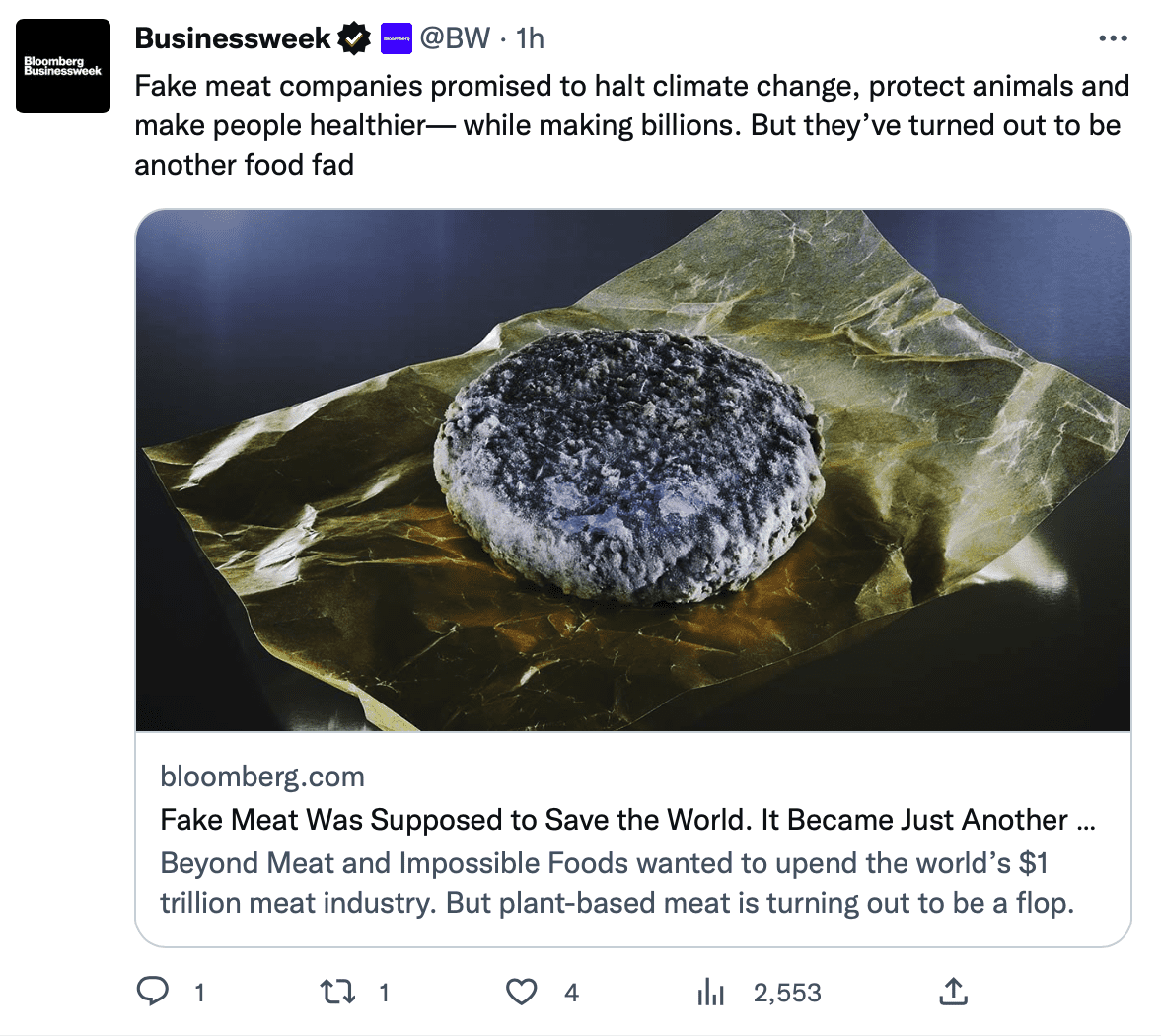Markets
Is Plant-Based a Fad or a Long-Term Trend? Elysabeth Alfano Interviews Bloomberg’s Deena Shanker
We’ve all seen the Bloomberg article declaring plant-based meats a fad. Author of the article and long-time food reporter, Deena Shanker, joins Elysabeth…

We’ve all seen the Bloomberg article declaring plant-based meats a fad. Author of the article and long-time food reporter, Deena Shanker, joins Elysabeth Alfano on Plant-based Business Hour…and they get into it.
Specifically, they discuss
- Do the grocery store sales figures from 2022 represent the whole sector? What about food service numbers?
- Do plant-based foods claim to be healthy or healthier and is a healthier option meaningful for the consumer?
- Should we consider the environmental benefits that will push adoption and government investment?
- What about food insecurity and national security benefits that will push government investment and adoption?
- Is it too early to announce fad vs. trend?
Below is a short clip and transcript from their conversation. Podcast here.
Elysabeth: A big part of your article was also on health and the health benefits or not and I think this is where it gets, to me, dicey. You pretty clearly feel that this is not a health food, am I summarizing that correctly?
Deena Shanker: I would just say that it’s not that I feel that it’s not a health food, it’s that I have not heard from a single person that isn’t selling these products that it’s a health food.
Elysabeth: Interesting.
Deena Shanker: So, health professionals do not call it that.
Elysabeth: Interesting, so I’ve had Dr. Kim Williams, the lead cardiologist from Rush Medical Center in Chicago who’s the past president of the American College of Cardiology say specifically that he sees these as healthier than. Nothing’s a carrot.
Deena Shanker: ‘Healthier than’ is very different than health food.
Elysabeth: Well, define health food, right?
Deena Shanker: A health food is something that promotes health.
Elysabeth: Loose.

Deena Shanker: Have you ever met a doctor that just said you should eat this? Or is it usually you should eat this ‘instead of’ or ‘is this a better choice’ or ‘maybe it’s a better choice?’ I’ve never heard any health professional that gives the kind of recommendation towards plant-based meats that they would give towards something like lentils or chickpeas.
I think that people want to say it’s healthier-ish maybe?
Elysabeth: And that’s the point: healthier. No one says it’s a carrot. I don’t think the companies themselves even claim that they would replace lentils or- they’re not in competition, for lack of a better expression, with lentils.
I do want to pull up some studies here. I’ve got to put on my glasses, gosh darn it. I want to pull up some studies here because you’re mentioning health professionals. I’ll just pull this up. I’m sorry for everyone listening on audio podcast. I’m reading here from the National Library of Medicine, “Colorectal cancer is the third most common cancer in men and the second in women worldwide. More than half of the cases occur in developed countries. The consumption of red meat (beef, pork, lamb, veal, mutton) is high in developed countries and accumulated evidence is convincing of an association between the intake of red meat and especially processed meat for colorectal cancer.”

I can do the same for- this is a Harvard study talking about trimethylamine N-oxide. From the Harvard study called, “Red Meat, Trimethylamine N-oxide and Your Heart.” It says “A substance called trimethylamine N-oxide is produced in your body when it digests red meat. It may raise the risk of cardiovascular problems.”
And then there’s also animal heme. “Animal heme is an essential nutrient from dietary proteins and critically impacts diverse physiological and pathological processes” basically saying here “a wide range of epidemiological studies have focused on examining the association of dietary heme intake, mainly from red meat, with risks of common diseases.” So, you have asked about health professionals, and I read these articles and see the “better than” option.
Elysabeth Alfano is the CEO of VegTech Invest, the advisor to the VegTech Plant-based Innovation & Climate ETF, EATV. She is also the founder of Plant Powered Consulting and the Host of the Plantbased Business Hour.

Wittiest stocks:: Avalo Therapeutics Inc (NASDAQ:AVTX 0.00%), Nokia Corp ADR (NYSE:NOK 0.90%)
There are two main reasons why moving averages are useful in forex trading: moving averages help traders define trend recognize changes in trend. Now well…
Spellbinding stocks: LumiraDx Limited (NASDAQ:LMDX 4.62%), Transocean Ltd (NYSE:RIG -2.67%)
There are two main reasons why moving averages are useful in forex trading: moving averages help traders define trend recognize changes in trend. Now well…
Enamoring stocks: Blink Charging Co (NASDAQ:BLNK -10.68%), Bristol-Myers Squibb Co. (NYSE:BMY -0.47%)
There are two main reasons why moving averages are useful in forex trading: moving averages help traders define trend recognize changes in trend. Now well…














